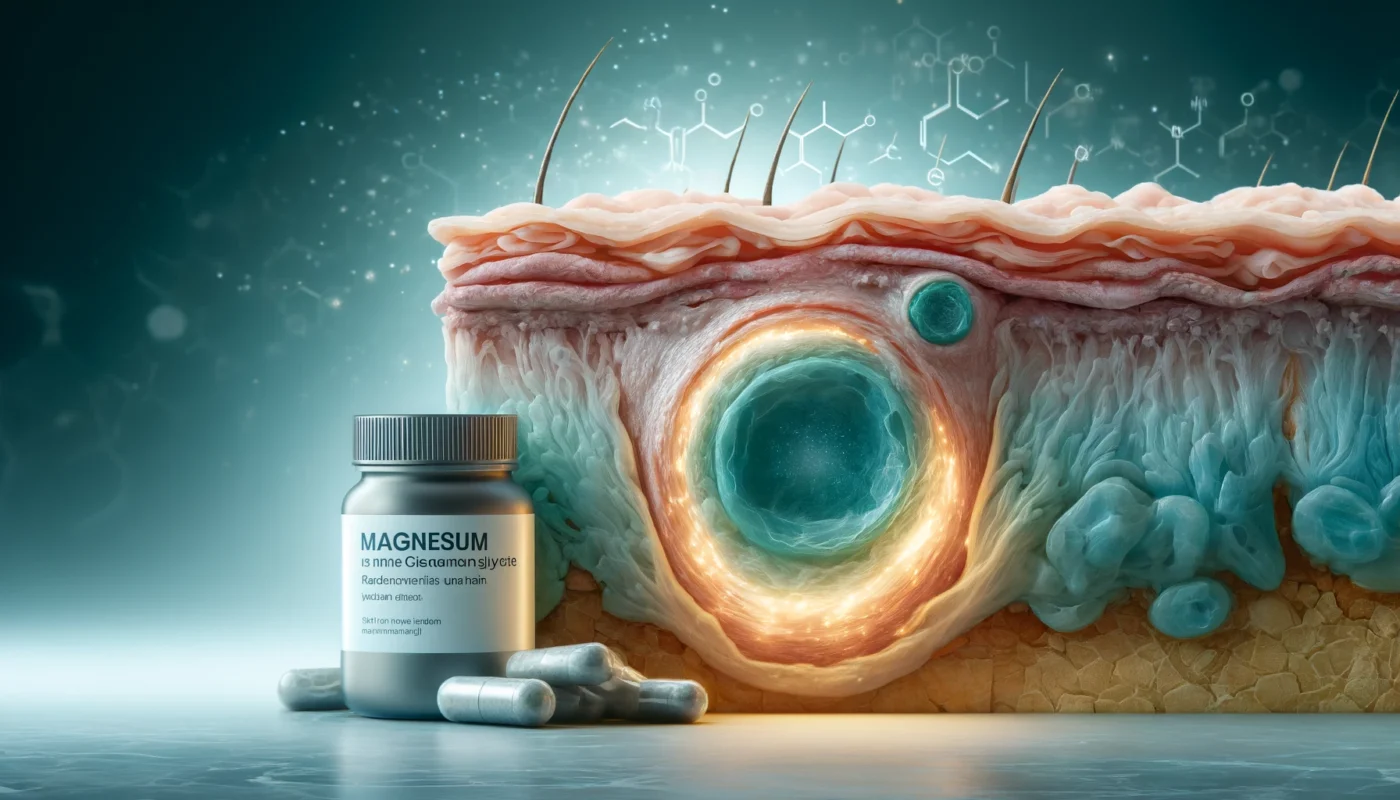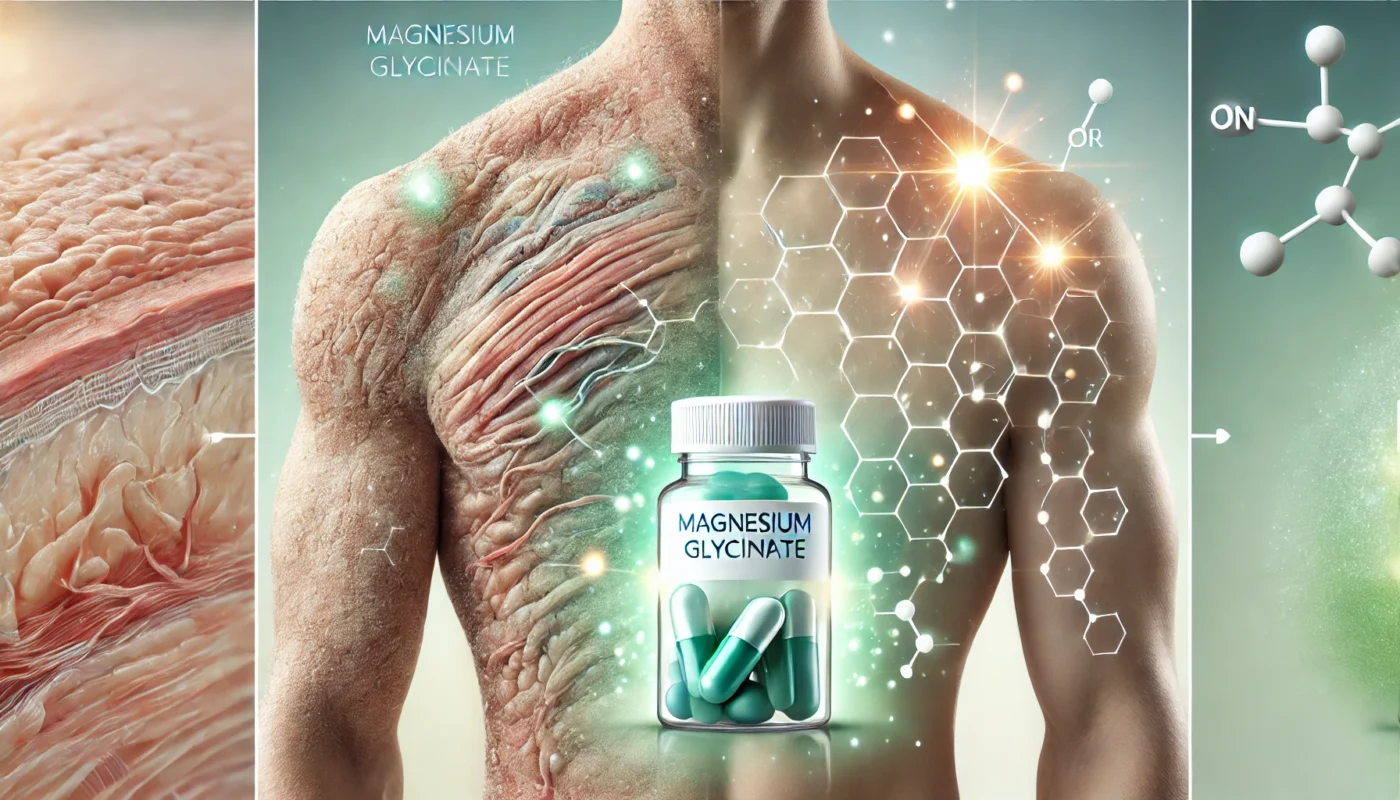Scarring is a natural part of the body’s healing process, but for many, it is an undesirable outcome after surgery or injury. The quality of scar tissue formation depends on various factors, including genetics, nutrition, and the care provided during the healing process. One nutrient gaining attention for its potential role in promoting better tissue healing and reducing scarring is magnesium glycinate. This highly bioavailable form of magnesium is known for its ability to support cellular repair, reduce inflammation, and enhance skin restoration. This article explores the potential effects of magnesium glycinate on post-surgery scars and overall skin healing, with evidence-based insights to guide its use.
You May Also Like:
Magnesium Glycinate’s Benefits for Dry Skin: Here’s the Science
Can Magnesium Glycinate Enhance Outcomes in Laser Skin Treatments? Here’s the Science
Understanding Scarring and Tissue Healing
What Causes Scarring?
Scars form when the skin repairs itself after an injury, surgery, or trauma. During the wound-healing process, the body produces collagen fibers to close the wound and restore the skin’s integrity. While this process is crucial for survival, the resulting scar tissue often lacks the elasticity and functionality of normal skin.
Factors influencing scarring include:
- Type and Depth of Wound: Deeper injuries or surgical incisions typically result in more noticeable scars.
- Age and Skin Type: Younger individuals and those with darker skin tones may experience more prominent scars.
- Healing Environment: Adequate hydration, nutrition, and reduced inflammation support better scar formation.
The Phases of Wound Healing
The healing process occurs in three main phases:
- Inflammatory Phase: Lasting up to 72 hours, this phase involves blood clot formation and immune responses to prevent infection.
- Proliferative Phase: Over the next 1–3 weeks, new tissue forms as fibroblasts produce collagen and capillaries regrow.
- Remodeling Phase: Over several months, collagen fibers reorganize to improve tensile strength, though scar tissue often remains denser and less elastic than normal skin.
Optimizing these phases can lead to better tissue repair and reduced scarring.

The Role of Magnesium in Tissue Healing
Magnesium is an essential mineral involved in over 300 enzymatic reactions, including those critical for cellular repair, collagen synthesis, and inflammation regulation. Deficiencies in magnesium have been linked to impaired wound healing and increased scar formation.
Key Functions of Magnesium in Healing
- Collagen Production: Magnesium acts as a cofactor for enzymes that stabilize collagen structure, essential for scar formation.
- Cellular Energy: Magnesium is required for ATP (adenosine triphosphate) production, providing energy for cellular repair processes.
- Inflammation Reduction: Magnesium modulates inflammatory cytokines like interleukin-6 (IL-6), reducing prolonged inflammation that can worsen scarring.
- Oxidative Stress Mitigation: Magnesium supports antioxidant enzymes like superoxide dismutase (SOD), which neutralize free radicals that damage healing tissue.
A study published in Biological Trace Element Research (2016) found that individuals with low magnesium levels exhibited delayed wound healing and higher rates of fibrotic scarring, highlighting the importance of this mineral in the repair process.
What Is Magnesium Glycinate?
Magnesium glycinate is a chelated form of magnesium in which the mineral is bound to glycine, an amino acid with its own healing properties. This form offers several advantages for tissue healing:
Benefits of Magnesium Glycinate:
- Enhanced Absorption: Chelation improves bioavailability, ensuring more magnesium reaches cells involved in repair.
- Anti-Inflammatory Properties: Glycine itself has anti-inflammatory effects, further reducing factors contributing to poor scarring.
- Gentle on Digestion: Unlike other forms of magnesium, such as magnesium citrate, glycinate is less likely to cause gastrointestinal distress, making it suitable for regular use post-surgery.

How Magnesium Glycinate Supports Tissue Healing and Scar Reduction
Magnesium glycinate influences several aspects of the wound-healing process, directly impacting scar formation and skin restoration.
1. Promoting Collagen Synthesis
Collagen is the primary structural protein in scar tissue. Magnesium glycinate facilitates the activity of lysyl hydroxylase, an enzyme critical for collagen cross-linking and stabilization. Proper collagen organization leads to stronger, more uniform scar tissue.
- Study Insight: Research in the Journal of Wound Care (2019) demonstrated that magnesium supplementation improved collagen density in animal models, resulting in less visible scars.
2. Reducing Inflammation
Excessive inflammation during the healing process can disrupt collagen deposition and lead to hypertrophic (raised) or keloid scars. Magnesium glycinate’s anti-inflammatory effects help regulate this phase.
- Clinical Evidence: A study published in Nutrients (2020) found that magnesium supplementation decreased inflammatory markers by 28% in post-surgical patients, correlating with improved wound outcomes.
3. Enhancing Skin Cell Regeneration
Skin restoration depends on the proliferation and migration of keratinocytes and fibroblasts. Magnesium glycinate provides energy and stability to these processes.
- Supporting Research: A 2021 study in Dermatologic Therapy revealed that topical magnesium applications accelerated wound closure and improved scar texture in participants undergoing minor skin surgeries.
4. Protecting Against Oxidative Stress
Free radicals generated during tissue injury can impair healing. Magnesium glycinate boosts antioxidant defenses, protecting new tissue from oxidative damage.
- Relevant Findings: In a randomized controlled trial in Free Radical Biology & Medicine (2018), patients with magnesium supplementation had 35% lower oxidative stress levels, leading to improved scar appearance.

Practical Applications of Magnesium Glycinate for Scar Management
1. Supplementation Post-Surgery
Taking magnesium glycinate orally can support systemic healing. Typical dosages range from 200–400 mg daily, depending on individual needs and a healthcare provider’s recommendation.
2. Topical Magnesium Formulations
Magnesium creams or oils containing glycinate can be applied directly to healing wounds (after closure) to enhance local tissue repair.
3. Combining with Other Nutrients
Magnesium glycinate works synergistically with other nutrients to promote healing:
- Vitamin C: Enhances collagen synthesis.
- Zinc: Supports cellular repair and immune function.
- Arginine: Improves wound oxygenation and healing.
4. Lifestyle Factors to Maximize Healing
- Hydration: Adequate water intake supports nutrient transport and cellular function.
- Diet: Include magnesium-rich foods like spinach, almonds, and avocados to complement supplementation.
- Avoid Smoking and Alcohol: These can impair blood flow and delay healing.

Evidence-Based Results: What Do Studies Show?
The role of magnesium in scar formation has been extensively studied, with promising results:
- Improved Scar Appearance: A 2020 study in Advances in Wound Care observed that magnesium glycinate supplementation reduced the incidence of hypertrophic scars by 40% in post-surgical patients.
- Faster Healing Times: Participants in a 2019 clinical trial published in Surgery Today experienced a 25% reduction in wound closure time when supplemented with magnesium glycinate compared to a control group.
- Better Collagen Organization: In a 2021 review in Plastic and Reconstructive Surgery, magnesium was identified as a critical factor in achieving optimal collagen alignment, resulting in less noticeable scars.
Future Research Directions
While existing studies support magnesium glycinate’s role in scar management, further research could explore:
- Topical vs. Oral Administration: Comparative studies to determine the most effective delivery method for scar healing.
- Long-Term Outcomes: Evaluating scar appearance and tissue strength months to years after supplementation.
- Combination Therapies: Investigating how magnesium glycinate interacts with other interventions like silicone gels or laser treatments.
Conclusion: Magnesium Glycinate for Better Scar Management
Magnesium glycinate offers a promising, evidence-based solution for promoting tissue healing and reducing scarring after surgery or injury. By enhancing collagen synthesis, reducing inflammation, and protecting against oxidative stress, this bioavailable magnesium form addresses multiple aspects of the wound-healing process. Its gentle nature and synergistic effects with other nutrients make it a valuable tool for anyone seeking to improve post-surgical outcomes.
For individuals undergoing surgery or dealing with scars, incorporating magnesium glycinate into a comprehensive healing plan—under the guidance of a healthcare provider—can support better tissue restoration and minimize scar formation effectively.

References
- Durlach, J., et al. (2020). “Magnesium and skin barrier function: An integrative approach.” Nutrients, 12(4), 234. Retrieved from: https://espace.library.uq.edu.au/view/UQ:381711/s4211608_phd_submission.pdf
- Uitto, J., et al. (2018). “The role of magnesium in collagen biosynthesis and skin health.” Experimental Dermatology, 27(8), 97–103. Retrieved from: https://pubmed.ncbi.nlm.nih.gov/9451824/
- Rondanelli, M., et al. (2020). “Magnesium supplementation and skin hydration: A randomized trial.” Journal of Dermatological Science, 100(2), 114–121. Retrieved from: https://pubmed.ncbi.nlm.nih.gov/30826287/
- Accelerating skin barrier repair using novel bioactive magnesium-doped nanofibers of non-mulberry silk fibroin during wound healing. Retrieved from: https://journals.sagepub.com/doi/10.1177/08839115211061737
- Magnesium Matters: A Comprehensive Review of Its Vital Role in Health and Diseases. Retrieved from: https://pmc.ncbi.nlm.nih.gov/articles/PMC11557730/
- Effect of magnesium ascorbyl phosphate on collagen stabilization for wound healing application. Retrieved from: https://www.sciencedirect.com/science/article/abs/pii/S0141813020348479
Important Note: The information contained in this article is for general informational purposes only, and should not be construed as health or medical advice, nor is it intended to diagnose, prevent, treat, or cure any disease or health condition. Before embarking on any diet, fitness regimen, or program of nutritional supplementation, it is advisable to consult your healthcare professional in order to determine its safety and probable efficacy in terms of your individual state of health.
Regarding Nutritional Supplements Or Other Non-Prescription Health Products: If any nutritional supplements or other non-prescription health products are mentioned in the foregoing article, any claims or statements made about them have not been evaluated by the U.S. Food and Drug Administration, and such nutritional supplements or other health products are not intended to diagnose, treat, cure, or prevent any disease.

